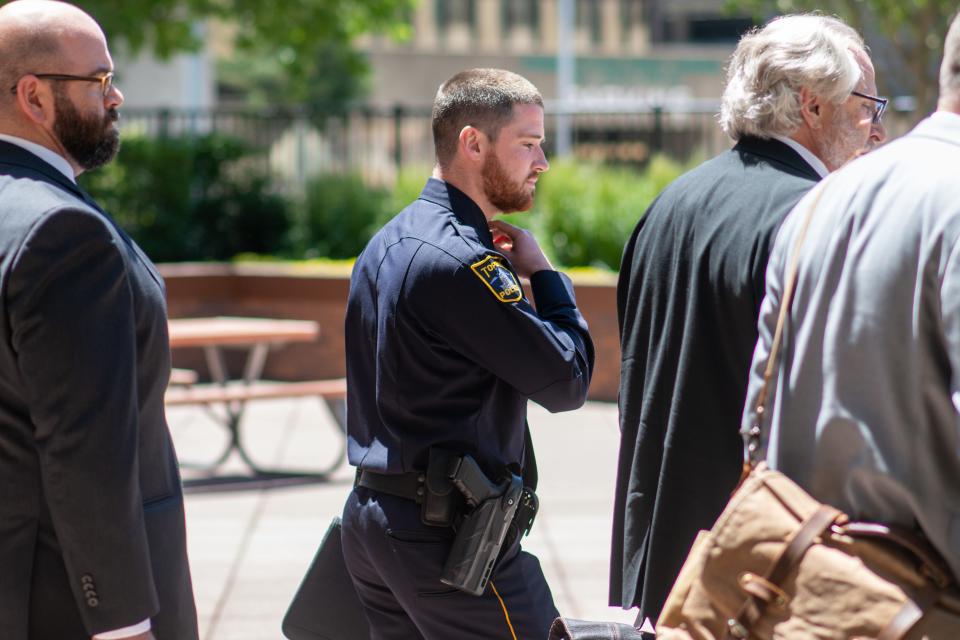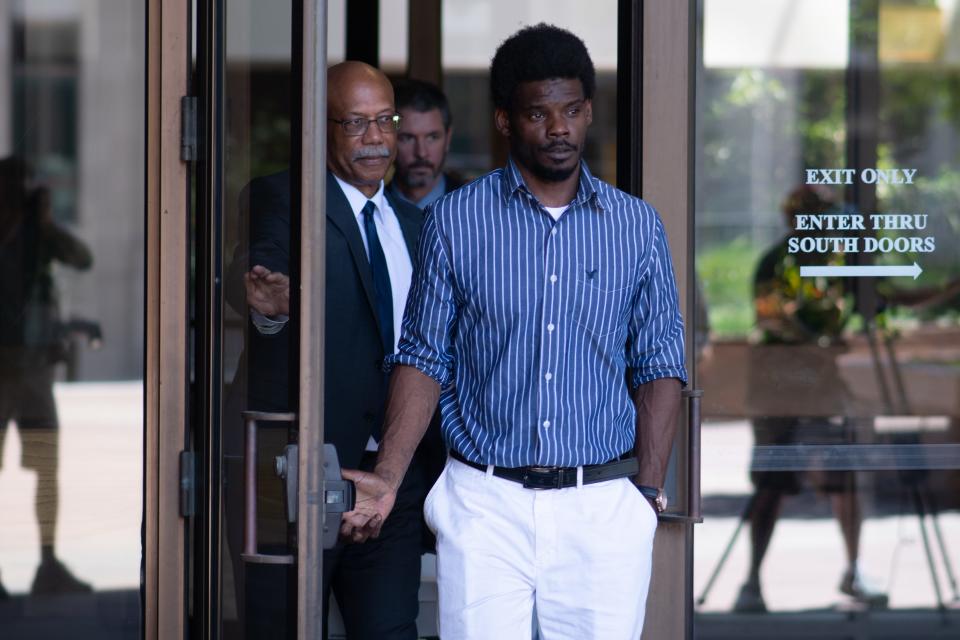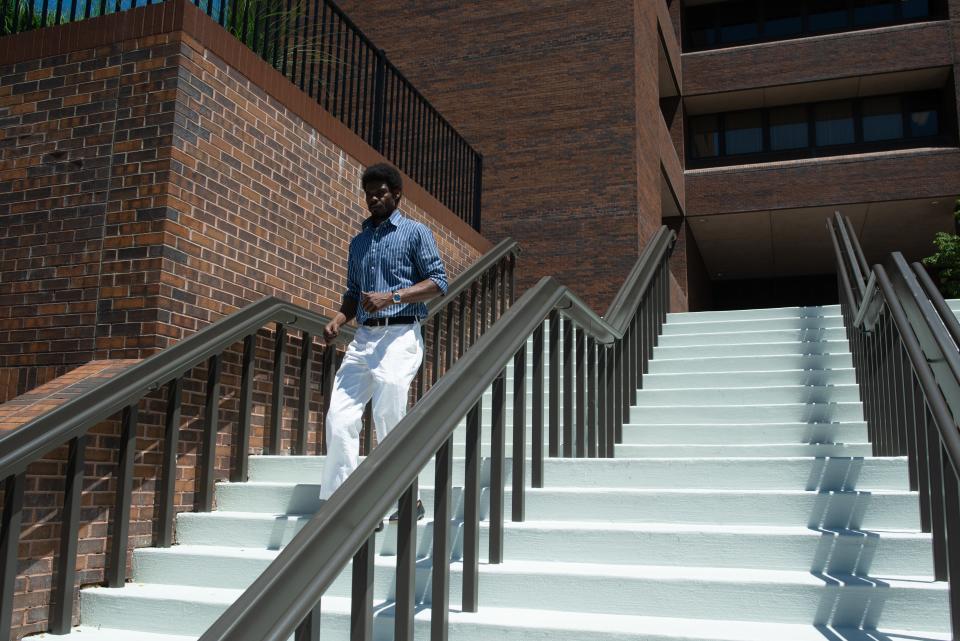Jury finds Topeka police officer did not violate man’s rights, use excessive force in 2018 arrest
Topeka police officer Chris Janes did not violate Timothy Harris’ Constitutional rights when he arrested him on Jan. 23, 2018, in East Topeka, a federal court jury ruled Thursday at the end of a trial.
Jurors deliberated about two and a half hours at the federal courthouse in Topeka before reaching a unanimous verdict in the use of force lawsuit Harris, who is Black, was pursuing against Janes, who is white and has been a Topeka police officer since 2016.
"The city is pleased with the jury's verdict," Topeka city attorney Amanda Stanley told reporters afterward.
She said jurors realized “what the city has known all along,” that the amount of force Janes used was not excessive given the circumstances involved.

Harris alleged that Janes violated his Constitutional rights by beating him and breaking his jaw while his hands were cuffed behind his back in January 2018 in East Topeka.
Harris, 38, initially also sued Topeka's city government, claiming its police training and supervision policies were the moving force behind the alleged Constitutional violations.
That count was subsequently dismissed, though the city continued to help with the defense of Janes, who is now a Topeka police K-9 officer.
Harris asked for $1 million plus attorney’s fees, which totaled about $200,000 as of mid-January.
Janes responded that his conduct was reasonable under the circumstances involved and he didn't violate Harris' rights.
U.S. District Senior Judge Sam Crow ruled in August 2019 that a reasonable jury could conclude Janes violated Harris' Fourth Amendment rights due to the amount of force he used on Harris as his hands were cuffed behind his back and he wasn't resisting.
He wrote that Janes should have known that “It was unconstitutional to take down the arrestee face-first, to apply knee pressure to his back, to punch him in the face, and to pepper spray him when the arrestee is restrained by handcuffs, is cooperating by walking to the patrol car and is not resisting."

But one of Janes' attorneys, Allen Glendenning, of Great Bend-based Watkins Calcara, Chartered, told jurors in opening arguments Tuesday that this week that they would hear, as the late radio commentator Paul Harvey called it, "the rest of the story."
The three-man, five-woman jury that heard the case this week appeared to be all white. Its eight members said they hadn't previously heard anything about the case.
Jurors finished hearing testimony early Wednesday afternoon, after Harris' attorneys put forth two witnesses and Janes' attorneys put forth three.
Harris and Janes each spent about two hours on the witness stand.
Here are five takeaways from the closing arguments that preceded Thursday's verdict.
Attorney: Topeka officer shook man 'like a rag doll'

One of Harris' attorneys, Carlton Odin, of Chicago-based Action Injury Law Group, LLC, encouraged jurors to watch the body camera video of the incident as many times as they needed to in order to understand what happened.
"Timothy Harris didn't deserve what happened," he said. "No resident of the city of Topeka should ever have to anticipate that that could happen to them."
Odin said even though Harris was cooperating with Janes, Janes threw him down to the concrete "like a rag doll."
"Timothy is not a rag doll," Odin said. "He is a human being. You don't throw human beings down like rag dolls."
Odin suggested Janes caused the encounter to escalate by losing his temper after Harris, whom Janes had just handcuffed, asked him, "Are you happy now?"
Attorney says Topeka officer Chris Janes' actions were reasonable
Glendenning suggested in closing remarks that Harris instead escalated the incident by resisting physically after he got out of the car and Janes tried to physically guide him back into it.
Janes testified that Harris showed at least eight "pre-attack indicators" suggesting he was about to attack Janes or try to escape.
He said those included taking off his jacket on a 30-degree evening, apparently to give himself more freedom of mobility; getting out of the car he was in without permission; and tensing up as he was being cuffed behind his back to test his strength against that of Janes.
Glendenning sought to draw jurors' attention to testimony given Wednesday by Sgt. Ruben Salamanca, assistant director of the Topeka Police Academy.
He noted that Salamanca had testified that the actions Janes took were consistent with those that would be taken by a reasonable police officer.
He stressed that Harris’ attorneys had not provided any alternative versions of what reasonable conduct would be in the situation involved.
Jury instructions allow for officers to make 'honest mistake'
Instructions given to jurors Thursday morning called for them to take into account "whether a reasonable officer on the scene without the benefit of hindsight would have used that much force under similar circumstances," Glendenning noted.
Those instructions give officers the latitude to make an "honest mistake" regarding the amount of force needed, he stressed.
"An officer can act reasonably without using the least amount of force necessary, so long as the amount of force used was not excessive," those instructions said. "And, if an officer reasonably but mistakenly believed that a suspect was likely to fight back, the officer would be justified in using more force than in fact was needed."
Each side claims the other one lied

Odin accused Janes of lying on the stand, while Glendenning accused Harris of lying.
Glendenning said numerous statements Harris made on the witness stand and in a deposition prior to this week's trial were contradicted by medical records documents and police body camera video.
"Mr. Harris told you falsehood after falsehood after falsehood after falsehood," he said.
Odin said Janes' defense was based largely on his false assertion that the handcuffed Harris reached for Janes' handgun as Janes was holding him on the pavement.
Janes' having told that lie makes everything else he said "worthy of being disregarded," Odin said.
He and Harris' other attorney, Ben Stelter-Embry of the Leawood-based Protzman Law Firm, put on a physical demonstration, with Stelter-Embry being in Harris' role and Odin in Janes', to illustrate why they felt convinced it would have been physically impossible for Harris to reach around Janes to get that gun.
National debate about police reform discussed in closing remarks
Both attorneys during closing arguments made reference to the ongoing national debate regarding police reform.
Glendenning suggested this week's trial wasn't an appropriate forum to take that into account, saying it's "not fair to dump it on Officer Janes' head."
Odin disagreed, saying that if Janes' behavior is an example of what's happening on the national stage, "It should be called that."
Tim Hrenchir can be reached at threnchir@gannett.com or 785-213-5934.
This article originally appeared on Topeka Capital-Journal: Jurors hearing use of force lawsuit rule in favor of Topeka officer

